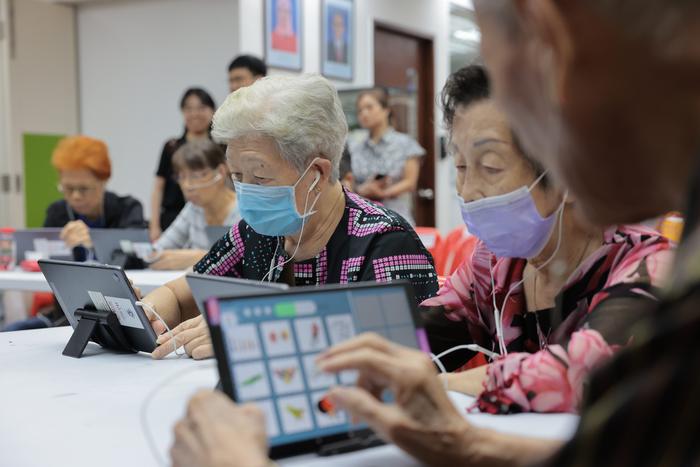Cognitive decline is inevitable as we age, but a research team led by Professor Yow Wei Quin from the Singapore University of Technology and Design (SUTD) is finding ways to slow the decline through language.

Credit: SUTD
Cognitive decline is inevitable as we age, but a research team led by Professor Yow Wei Quin from the Singapore University of Technology and Design (SUTD) is finding ways to slow the decline through language.
“Bilingualism is known to promote neuroplasticity and cognitive reserve, with research showing that lifelong bilingualism modifies brain structure and function in older adults. Importantly, bilingualism has been shown to delay the onset of Alzheimer’s disease by an average of 4.7 years. However, there are currently no studies that explore bilingual usage as a cognitive intervention to mitigate cognitive decline in older adults, and our study is the first to do this,” said Prof Yow, who is interested in leveraging bilingualism to promote well-being in older adults.
In their paper titled “A novel dual-language touch-screen intervention to slow down cognitive decline in older adults: A randomized controlled trial”, published in Innovation in Aging, the team found that implementing cognitive training in a dual-language mode improved the cognitive abilities of older adults.
The team developed a multilingual, touch-screen, game-based application for older adults known as the Dual-Language Intervention in Semantic memory – Computerised (DISC) tool. DISC is designed to encourage independent play while improving cognitive function. It features an avatar called Ah Mei who delivers instructions, feedback, and prompts to users should they need assistance.
Compared to other older adult-oriented game apps, DISC is unique in incorporating bilingualism as a core element of its cognitive intervention. “Most existing cognitive games either do not consider the specific needs of older adults or only offer single-language experiences. DISC stands out by utilising both languages simultaneously, enhancing the cognitive benefits,” explained Prof Yow.
To test the hypothesis that a greater use of two languages can affect cognitive ability positively, the researchers ran an intervention programme with DISC training sessions for cognitively healthy (CH) and cognitively impaired (CI) older adults recruited from senior care centres in Singapore. The participants were randomised into dual-language, single-language, and control groups.
Prof Yow’s team reported that both CH and CI older adults showed significant cognitive improvements after playing DISC in dual-language mode over the single-language group and the control group. For CH older adults, their visuospatial construction skills and the later stage of verbal learning showed improvement immediately after intervention. For CI older adults, only the early stage of verbal learning showed improvement six months after intervention.
The differences in cognitive improvement between CH and CI older adults could be due to the degeneration of brain areas responsible for these skills in CI participants, according to Prof Yow, who believed that these changes would not be reversible through cognitive training alone. With regard to the cognitive improvement delay in CI older adults, this is akin to the ‘sleeper’ effect, which has been observed in other cognitive training studies with older adults. “Some researchers speculate that this effect occurs because neural changes take longer to manifest at the behavioural level, particularly in individuals experiencing neural degeneration,” she said.
Compared to traditional cognitive training for older adults, DISC resulted in medium-to-large training effects. It also addressed the limitations of these traditional methods such as labour intensiveness, dependence on staff, poor comprehension of instructional language, and limited training effect size. Feedback from the senior care centre staff was also positive, indicating that most of the older adults were happy to play the DISC app, which freed up some time for caretakers to perform other duties.
The DISC app is now branded as the Ami (Advancing Mental Invigoration) app and its prototype is piloted at Lions Befrienders, a senior enrichment facility. The prototype of Ami app was installed on 1,000 tablets for facility members to use, showing the successful translation of evidence-based research into real-world settings.
Following this study, Prof Yow aims to further explore the bio-neural mechanisms and pathways involved in the associated cognitive improvement due to dual language use. Her team is also collaborating with community organisations to enhance the Ami app and integrate the app into their senior care services, further testing the efficacy of the Ami app in a community setting.
Prof Yow’s study perfectly exemplifies SUTD’s ethos of intersecting the use of design and technology in research. Unlike traditional laboratory-based academic research, Prof Yow’s team designed their app to be user-friendly for their target audience while still maintaining the scientific rigour of the study.
Said Prof Yow: “This cycle of design, technology development, and scientific research has culminated in the Ami app, which serves as an evidence-based cognitive programme inspired by bilingualism research and characterised by its user-centric design.”
Journal
Innovation in Aging
Article Title
A novel dual-language touch-screen intervention to slow down cognitive decline in older adults: A randomized controlled trial



